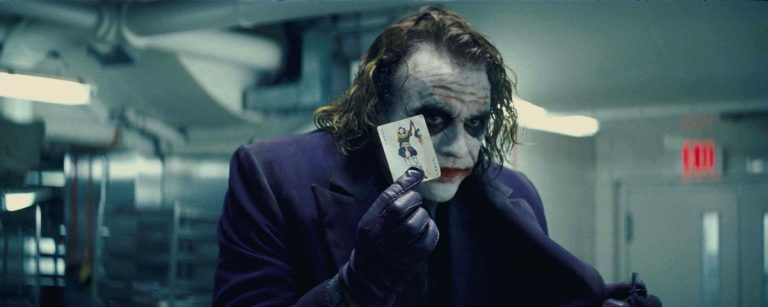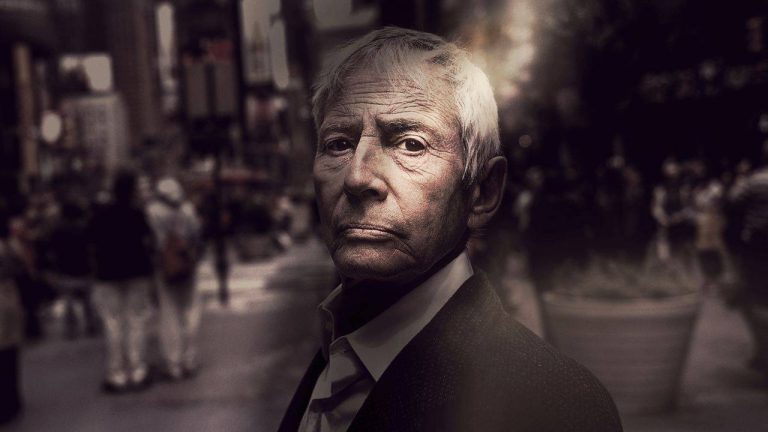Love, God, Silence: The Evolution of the Films of Ingmar Bergman: Every filmmaker is different. Most stay fairly consistent stylistically throughout their careers, thus giving their films something unique to identify with. Great directors take style one step further, using their movies as a medium to convey their personal thoughts, values, and beliefs. Take for example, Martin Scorsese’s 2016 film Silence. The movie centers around two 17th century priests in search of their mentor who is rumored to have committed apostasy. Along the way, they witness so many horrific things they begin to question not only their journey, but the very existence of God. The priests mirror Scorsese’s own search for religious solidarity, and the title of the film refers to the Silence of God. It is a beautiful film; one Scorsese calls his “signature” piece.
However, he is not the only filmmaker to address such themes in his work. Through three consecutive films of the early sixties, Swedish director Ingmar Bergman wrestles with his own religious demons. Though he himself denies these three pieces of cinema as being related in any way, the evolution of religious themes starting in Through A Glass Darkly, continuing in Winter Light, and concluding in The Silence, is too prominent to ignore. The purpose of this essay will be to examine these three films in depth, as well as a few other Bergman masterpieces made before and after this spiritual trilogy.
Related to Ingmar Bergman: 10 Great European Movies To Watch
In his earliest years, Bergman experimented with a few different types of films, most of which center on doomed romances. It Rains on Our Love, Port of Call, and To Joy all feature couples having difficulties in their relationships. The interpersonal struggles of these early films prelude the spiritual conflicts of Bergman’s later characters, so it is important to analyze such hopeless love affairs. In 1951’s Summer Interlude (which is arguably Bergman’s very first masterpiece), a lonely ballerina dancer named Marie recalls her first love when she was thirteen years younger. As a teenager, Marie is on summer vacation, where she meets Henrik. The two spark immediately, and the rest of the summer is filled with laughter and love. The conflict arises when the relationship is strained; Marie and Henrik become too preoccupied with their hobbies and aren’t finding enough time for each other. We are led to believe the affair will end here, but to our delight, the young couple works through their problems and the two become happy together once again. However, just when things are at their greatest point, Henrik suffers a fatal injury attempting to dive in the ocean off a rock face. After Henrik’s death, Marie is stricken with grief. In the most powerful scene of the film, she stares out a window, speaking of her contempt for God:
“I don’t believe God exists. And if he does, I hate him. And I’ll never stop hating him. If he stood before me, I’d spit in his face. I’ll hate him for as long as I live. I won’t forget. I’ll hate him till the day I die.”
Here, in this heartbreaking sequence, we are subject to a common theme of Bergman’s: his interpretation of how death affects relationships with The Lord. Throughout the film, Bergman uses clever motifs to subtly reminds us that death is always imminent. The most prominent of these is the poor old woman dressed in all black. Film author Robert Emmet Long points out that the woman is “…a pre-figurement of death. She appears later when Marie and Henrik go to Henrik’s house and she is introduced to this woman, his aunt.” The sick old woman mirrors the human subconscious constantly aware of the looming shadow of death. Through the old woman, Marie is reminded of mortality, yet the death of Henrik sends her into a blasphemous rant about her hatred for God. Bergman wants us to know of the constant struggle between God and Death, and how hard it is to remain true to the former when the latter takes hold. Though relatively subtle in Summer Interlude, Bergman pushes this spiritual battle to the forefront in the 1957 classic, The Seventh Seal.
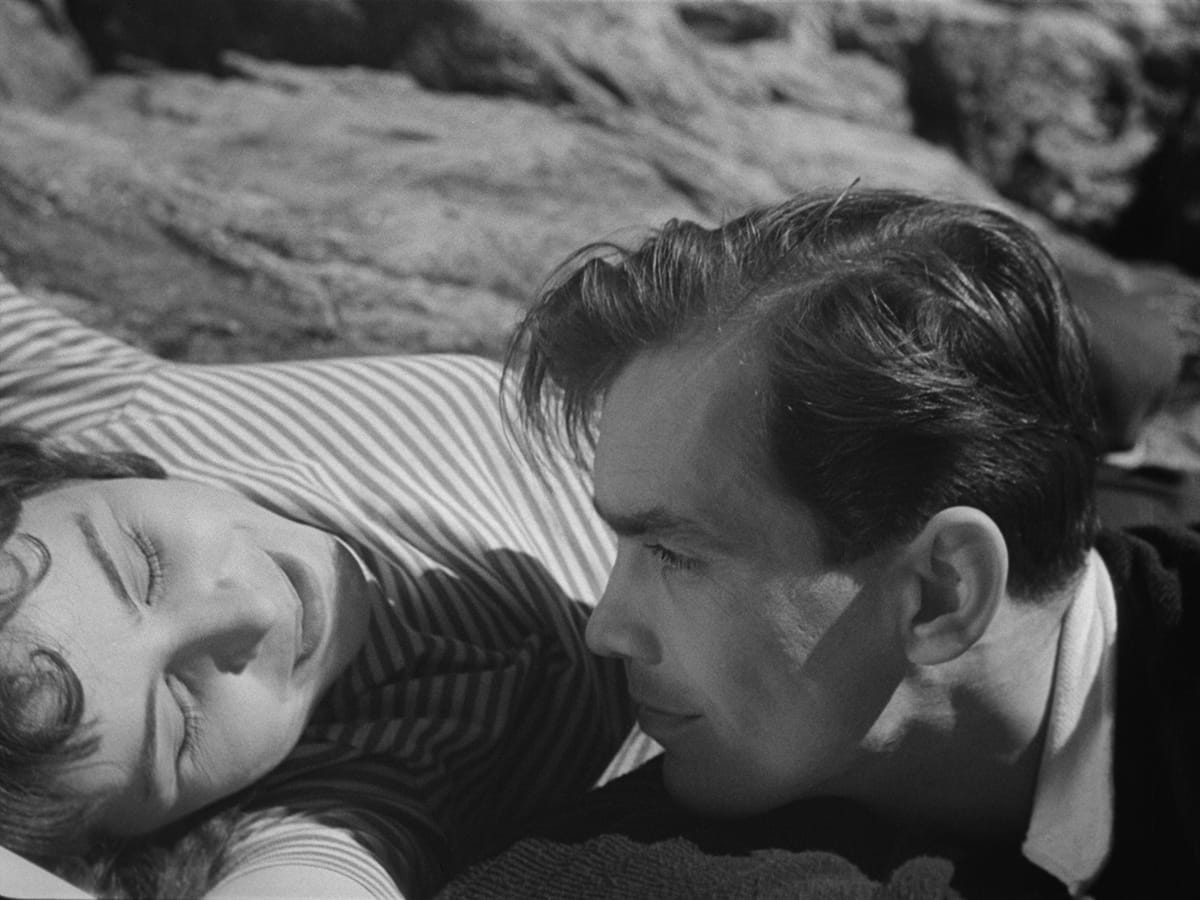
Considered by most to be his greatest film, The Seventh Seal focuses on a knight named Antonius Block, who returns from the crusades to find Europe devastated by The Black Plague. When Death, a harrowing figure cloaked all in black, appears to take Block, the knight challenges him to a game of chess. Should Block win, he gets to live, and vice versa. Death gladly accepts. The chess match serves as the backdrop of the film; Block meets an array of different characters throughout the movie, but occasionally finds a secluded spot to make his next move of the chess match. These secondary characters are also potential victims of the Plague, and by offering them his companionship, the knight Block binds them to his fate. The Seventh Seal continues the religious conflict hinted to in Summer Interlude, adding higher stakes for its main character. As a knight of the Crusades, Antonius Block does not view God as merely a part of his life, but his entire earthly purpose. Therefore, should Death win out over The Lord, it would discredit any meaning in Block’s existence. Not only does the knight fight Death with chess pieces, but he seeks confirmation of the existence of God. If Death can show himself so easily, why can’t Block’s Almighty Father prove his own existence? This is the central question of The Seventh Seal; Antonius Block’s personal fight with “God versus Death” is also his quest for meaning in his life.
The Seventh Seal is important in the evolution of Ingmar Bergman for many reasons. Primarily, it is the first to address God’s Silence. “God’s mercy and a transformation from death to life is what Antonius Block seeks,” says author Jesse Kalin. “For Block, God is silent and absent. He cannot be seen, he does not talk. There is something literal about the knight’s need ‘to grasp God with the senses.’” Here, Kalin has spelled out the simplicity of Block’s desire: modest confirmation that God exists. His wish is never granted. A morbid thought, yes, but the film does not necessarily follow that ominous notion all the way to the final frame. Though his inner quest for a literal confirmation of The Lord’s existence fails, the frustrated knight still believes he can reach salvation should he save just one of his followers from a gruesome death courtesy of the Plague.
Related to Ingmar Bergman: 10 Best Films of Woody Allen
As mentioned before, Block has a group of people bound to his fate. Towards the end of the movie, he distracts Death by “accidentally” knocking pieces off the chessboard, while a few of the travelers Block was with are allowed to escape. On the next move, Death wins the game, solidifying the fate of Block and the rest of his crew. However, despite Death’s earlier claim that “no one escapes me,” the young family following Block did in fact get away. In this way, Block finds redemption; he sacrifices himself and multiple others (even though they were probably doomed anyway) in order to save the lives of people he thought important enough to live on.
This 1957 treasure acts as a sort-of prequel to the before-mentioned “trilogy” that Bergman makes later in his career, at the end of which the director essentially makes the statement that he has given up believing. Those three films deal with love, doubt, and then silence, in that order. But with the ending of The Seventh Seal, Bergman tells us that the fight for meaning and belief is far from over. It would have been easy for Block to lay down his sword and accept the absence of God, but instead, he saves the lives of three innocents in hopes of redemption. The Lord still has not shown himself, but the knight refused to give up trying, even to his own grave.
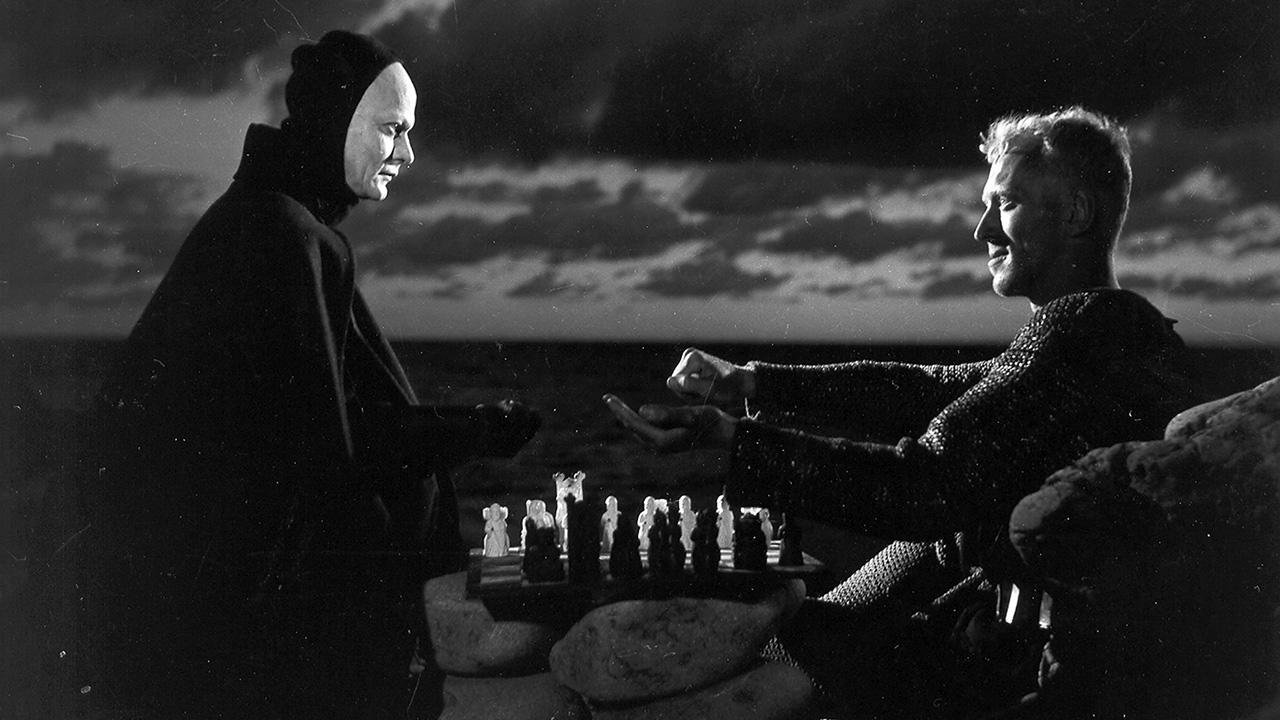
In between The Seventh Seal and Through A Glass Darkly, Bergman makes The Virgin Spring. The movie would win the Best Foreign Language Film award at the 1960 Academy Awards; the first golden statue awarded to a Bergman project. The premise of the film, though very dark, is also quite simple: a young woman traveling on horseback is brutally raped and murdered by a trio of goat herders. The criminals then unknowingly take shelter in the young girl’s parents’ house and are eventually served a steaming hot plate of revenge by the infuriated father of the victim. The film is worth mentioning because of its strong themes of Christianity, and furthermore the consequences and redemptions dealt to the characters because of their beliefs.
The innocent girl is Karin. She is reluctantly sent out on a journey to deliver candles to her family’s local church, as an offering to The Virgin Mary. She is, of course, a virgin herself, which is the core reason her parents give her the task of carrying the holy candles. On the ride, however, her untainted status becomes her downfall as she is violated by evil men. In other words, she would not have been murdered had she not been assigned to the task of “the virgin.” In this way, Bergman is telling us something about how Christians’ view of purity is all too important to them. The value of innocence is not nearly as rewarding as the brute satisfaction of violence and vengeance, as Karin’s father discovers when he permanently silences his daughter’s assailants. Though still robbed of his child, the father Tore has made peace with her death by exacting revenge. This allows him to kneel before his daughter’s corpse and pledge to build a church on the site.
What happens next is best described by author Robert Emmet Long: “A spring suddenly wells from the soil as if to sanction the drama of Christian rebirth through sin and atonement.” This event is a breakthrough in the evolution of Ingmar Bergman; we have been searching for an adamant sign of the existence of God, and the sudden welling of this “Virgin Spring” is the strongest evidence we have seen so far. Yet, it was not achieved through traditional Christian practices, but rather the breaking of sacred commandments for redemption of the ones we love. This new idea, that perhaps God is linked more closely to love than to his rigid laws set forth in The Bible, is solidified more in the opening film of our spiritual trilogy.
Through A Glass Darkly is the first of our three main films. It was made in 1961, just a year after The Virgin Spring. It was highly praised, earning Bergman a second consecutive Best Foreign Language Film award at the Oscars. It features only four characters throughout the entirety of the movie: A troubled woman suffering from schizophrenia, her equally troubled husband, her novelist father, and her younger brother. Over a twenty-four-hour period on a secluded vacation island, the declining mental health of the woman (Karin) greatly impacts the lives of the three men who most strongly care for her. A while into the film, we learn that Karin is plagued by a vision of a group of people waiting in a large room with one door. We are told that someone is coming to see them, and that it may be God himself. She tells only her brother of this dream, and he becomes deeply concerned for her, even more so than he already was. Around the same time in the film, Karin’s father, David, tells her husband, Martin, of his own suicide attempt while on holiday in Switzerland. After an accident and near escape of death, David explains that he was suddenly overcome with a burning love for his family.
This is the first inclination that Through A Glass Darkly takes over where The Virgin Spring left off: God saved David’s spirit by filling him with love. It is made very clear, however, that this is the only form that God will present himself in: when the end of Karin’s vision is finally revealed, it is not God who walks through the door to greet all the people, but rather a giant spider that sexually assaults her. Though Karin is almost completely out of her mind at this point, her hallucination combined with David’s revelation does suggest that God cannot take human form but is closely linked to the feelings of love. This is confirmed by the final scene of the movie, in which David tells his son what he believes to be proof of God’s existence: “I can only tell you a thought of my own hopes. It is to know that love exists for real in the human world.” He goes on to question whether “…love is proof of God’s existence or if it’s God himself.” Though still puzzled by that final question, it would seem to most that perhaps Bergman has his character David explain to us what Bergman truly believes God to be: the love we have for one another. However touching this may be; the notion that the director has accepted The Lord in this manner, it could not be further from the truth.
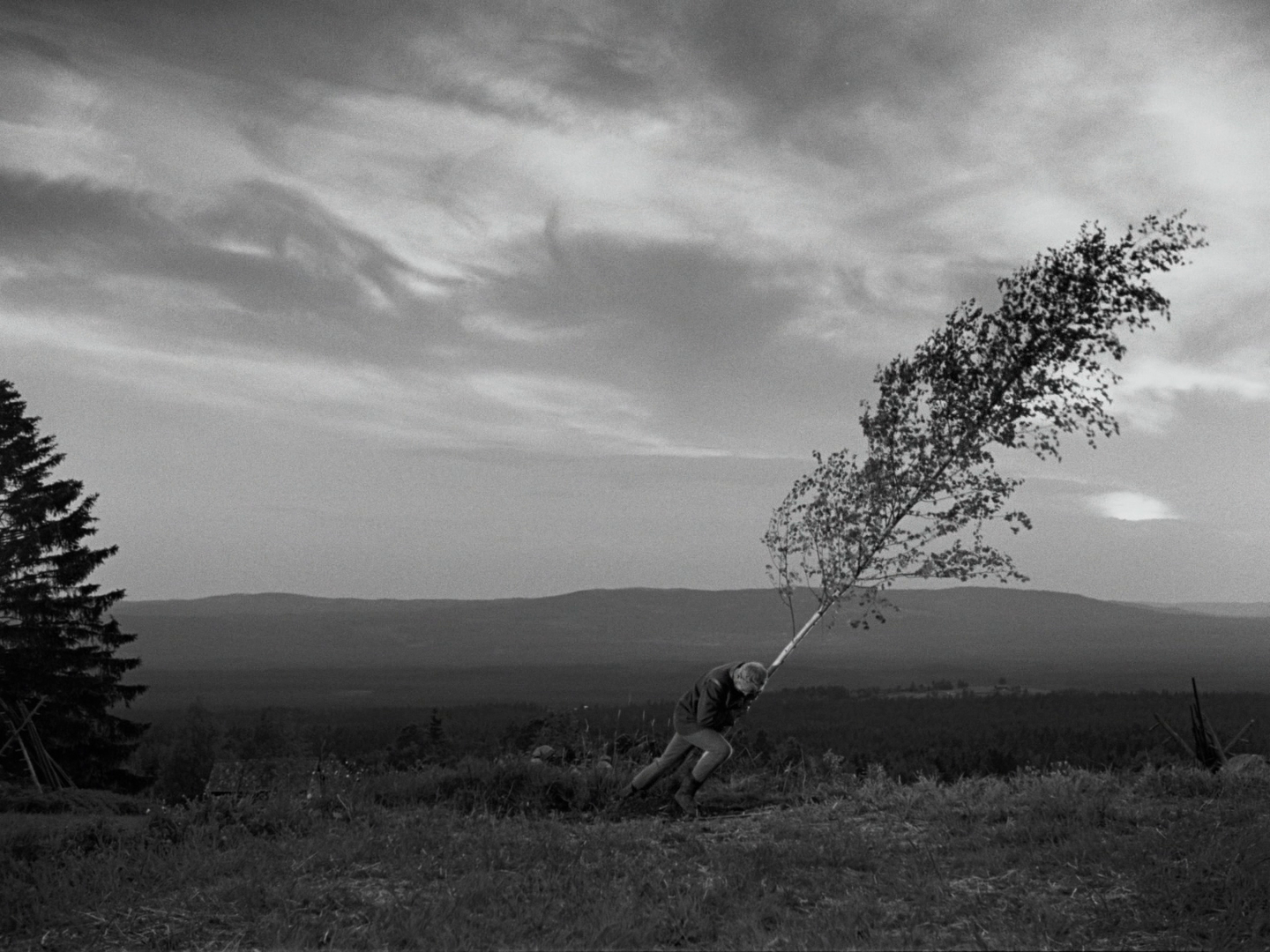
Though he believed the film was well made, Ingmar Bergman absolutely hated the way the end of Through A Glass Darkly was perceived. He despised the idea of the “God is love” lesson and set out on a new venture to correct this improper reflection of his own belief. With Winter Light, Bergman puts a struggling priest in the spotlight. Coincidentally (or not so much), the priest is played by the same actor as David from the previous film. This casting choice helps the audience with the reconsideration of the words spoken at the end of Through A Glass Darkly. The priest, Tomas, has pretty much lost his faith after the death of his wife. His daily routine has become an empty, going-through-the-motions affair. Going all the way back to Summer Interlude, Bergman once again brings up the theme that death causes the severest contempt for God. Tomas does not denounce the Lord quite as directly as Marie did, but he is sent into a spiraling web of doubt. No one around him makes him feel any better, and like Antonius Block, Tomas struggles to find any more meaning in his life. However, unlike the knight, Tomas does not have any ambition to redeem himself. When a depressed churchgoer comes to the lonely priest for help, Tomas essentially talks the man into suicide by offering him such poor spiritual advice.
“When people cannot engage, or even try to understand each other, God is absent.”
Winter Light is an extremely cold and empty film for a reason. Bergman wants us to know of God’s absence. He wants us to look back at Through A Glass Darkly and consider that David’s rants about love and God are just the absurdity of an aging author, and that perhaps the real God is in fact the grotesque spider in Karin’s dream. The character of Marta in Winter Light only backs up these new, troubling notions. She loves Tomas, and feels it is her responsibility to ease his troubles. He plays along mostly, not wanting to be rude or overly cynical. However, after the suicide of the man in his congregation, Tomas doesn’t seem to care anymore. He unloads on Marta, insulting her in a variety of extremely rude manners. Despite this, she clings to him. For her, perhaps the “God is love” is still in play; because of her affection for Tomas, she refused to let him go although he has been unflinchingly cruel to her. Tomas however, has completely given up on himself.
The final scene is pivotal, like most other Bergman movies. The priest stands in front of an empty church (despite the presence of Marta) to give mass. He says “Holy, Holy, Holy, is the Lord God Almighty.” This line can be interpreted one of two ways: “Given what has happened – a much-loved father and husband has killed himself, and Tomas has behaved appallingly towards Marta – the closing lines seem deeply ironical. Where is the glory of which Tomas speaks? Yet on the other hand, the new expression on Tomas’ face might appear to announce that now, and for the first time, he actually believes what he is saying.” Given the even darker themes of the final film in the trilogy, I believe Bergman wants us to believe that the so-called “glory” is gone, and Tomas’ words are as empty as his church.
Related List: 10 Favorite Films of Xavier Dolan
Following Winter Light is The Silence, made the very same year. Unlike many of his other works, the film does not take place on an island, but rather in what appears to be a European city. The three main characters, two sisters and a young boy, are holed up in an eerie hotel while one of the sisters has fallen ill. Besides the obviousness of the type of “silence” the title refers to, Bergman has created an alternate world in this film without specifically revealing the details of this fictional society. However, given that The Silence is the closing installment of a series of films about declining spiritual value, it would be safe to assume the movie is not a window into a society praising the Almighty. Author Irving Singer writes: “The Silence deals with modern civilization as a place in which the silence of God has been thoroughly accepted as an established reality in our life. The search for a word or other sign of his existence no longer occurs in the fictional conditions that Bergman depicts as the setting for the movie.” Now that God is completely out of the question, Bergman uses the character of Johan to illustrate the difficulties of living in such a forsaken society.
The two sisters in The Silence, Ester and Anna, are very different people. Ester is the bookworm; very intellectual, but not so much the social butterfly. Anna is much more liberated: she desires adventure and sex as most women do but is held down by Ester’s introverted behavior because of her sickness. This causes Anna to despise Ester, feeling as though she is bound to her ill, helpless sister. The most important character though is the young boy, Johan. Anna is his mother, making Ester his aunt. It appears the two women are the only caregivers for the boy, meaning that their actions are the greatest influence over him. Because Johan is so young, he has is not fully socially developed yet. It is not known whether he will follow in the footsteps of his reserved aunt or his erotic mother, so he seeks answers outside of the hotel room.
The ominous halls of this quiet inn mirror the outside world. Johan’s experiences in these corridors will sway his social construct towards one of his two caretakers. During his adventures, Johan is subjected to numerous oddball encounters. On several occasions, a very creepy servant man seems to attempt to seduce Johan, but he does not indulge. He runs into a band of dwarves on several occasions as they prance down the hallways. He also sees his mother engage in sexual activities with another woman, which upsets him. Because of the absence of God, he has nothing but his caretakers’ teachings to fall back on for reasonings behind these strange occurrences. Unfortunately for him, his aunt is dying, and it turns out his mother is somewhat of a raging whore (she also has sex with a waiter she meets in a café). Johan’s struggle to grasp onto any meaning is a metaphor for the chaotic atmosphere of a Godless world.
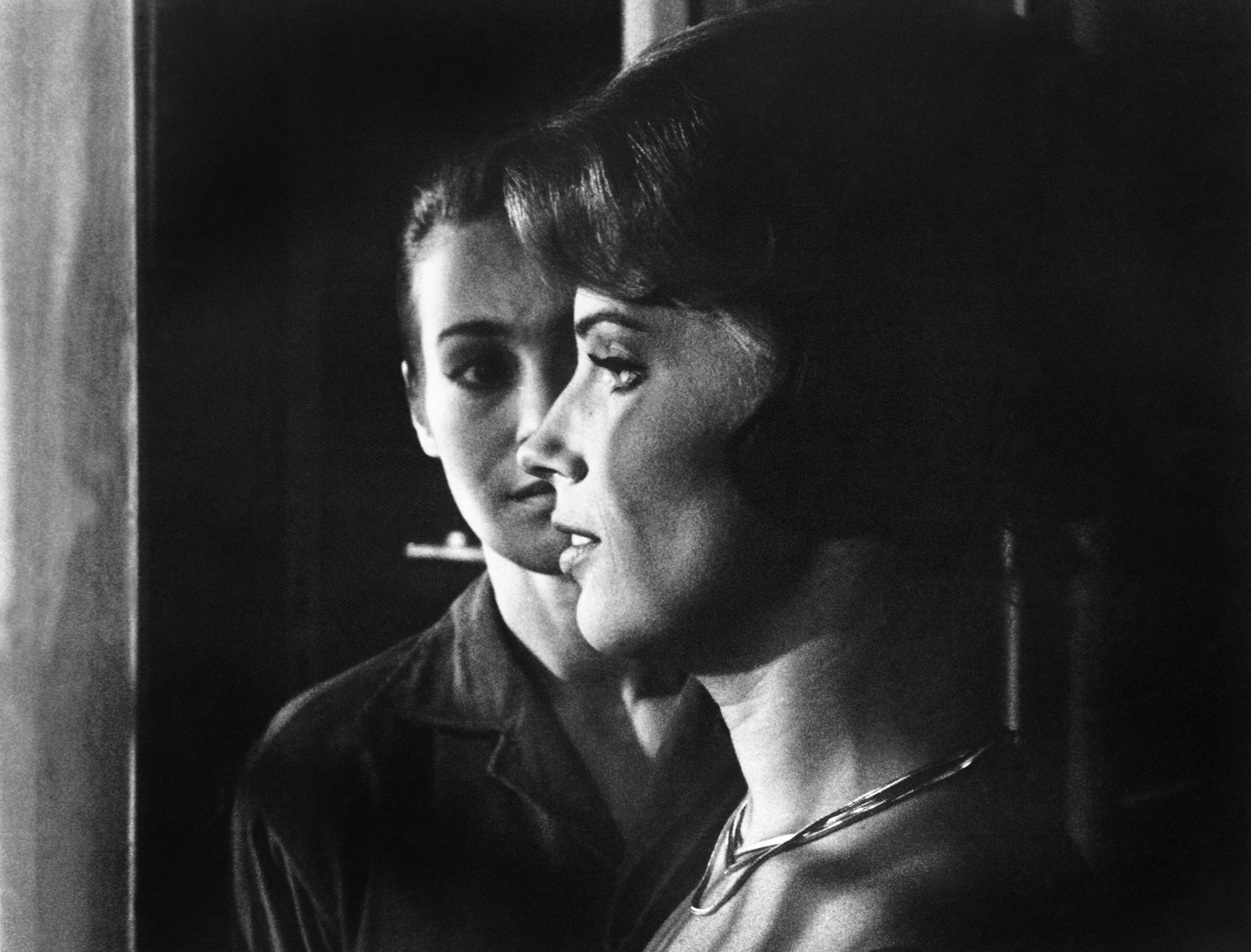
Once again, we find that the most meaningful scene of the picture comes at the very end. Anna and Johan leave Ester to die in the hotel. On the train home, Johan ponders over a small translation given to him by his aunt. It simply spells out three words: “spirit,” “joy,” and “anxiety.” Author Robert Emmet Long believes these three words are related in a special way. He says” “…the gulf between people may be bridged to some degree, that ‘spirit’ and ‘joy’ might be present in life as well as ‘anxiety.’” I strongly disagree with the author on this account. In fact, I believe the opposite. In a Godless world, these three items are exactly what is missing. There is no spirit, for The Lord doesn’t exist. There is no joy, for the voids between and inside of human beings is empty (Anna discovers this in her meaningless sexual encounters). However, most importantly, there is no anxiety; the constant worry experienced so severely by Antonius Block regarding the existence of God is stripped away from the cold, lifeless world created in The Silence.
Also Read: How Bergman Explores Dissociation and Identity in Persona
Ingmar Bergman has shown us his religious journey. Every spiritual step he has taken is, in one way or another, shown to his audience in his work through 1963. Without a godly bone left in his body, the legendary director turns to social issues. In 1966, he releases Persona. Though probably set in the same Godless universe as The Silence, the movie centers on the psychological battle between our two main characters, and not so much their struggle with any holy being. Featuring remarkable performances by Bibi Andersson and Liv Ullmann, the film focuses on two women played by these incredible actresses. One is a nurse, Alma, who is assigned to take care of an actress who has suddenly become mute in the middle of one of her performances. Sent to an island, Alma’s task is to get Elisabet Vogler to talk once again. Once alone with Vogler, Alma begins to change; at first for the better, but eventually the two girls’ “personas” come crashing down on each other.
Vogler’s view of the world is “cruel, empty, and formless.” For this reason, she has elected (yes, it is a choice) to stop speaking. She has experienced multiple walks of life, and perhaps her portrayal of so many different characters has turned her opinion of the world sour. Alma, however, is much different. She is still very curious, ambitious, and innocent (or so we are led to believe). She feels she has a purpose as a nurse, and is eager to attempt to heal the mysterious mental state of her new patient. The problem arises when the two become too close while in seclusion. One night, after a few drinks, Alma tells Vogler a story from her younger years about her sexual encounter with a boy on the beach. She has never told anyone this before, and even admits to Elisabet that her sexual acts with that random boy was better than she’s ever had; even more so than with her fiancée. By telling Vogler this, Alma has sacrificed her professional relationship with Elisabet. The two are now friends, and Alma’s guard has been significantly lowered. It is because of this that an event later in the film hurts the trust between the two women, instead of merely being a mishap chalked up to Vogler’s condition. When Alma opens a note from Vogler addressed to her doctor, she finds that Vogler has been studying Alma, instead of the other way around. Alma becomes internally outraged, and rightfully so; after all, she is the nurse, not Vogler.
Related to Ingmar Bergman: Understanding Bergman’s Persona (1966)
This marks the beginning of the disturbing morph of the two girls’ personalities. Much of the film from this point “…deals with Alma’s gradual entering, sometimes in the form of dreams, into Elisabet’s consciousness.” The minute detail in the letter by Vogler has left Alma viewing the world with a tad more skepticism, as she has been subject to a lashing of cruelty. In other words, she is one step closer to Elisabet’s harrowing perception of life. Like Tore all the way back in The Virgin Spring, Alma then finds satisfaction in a vengeful act: she purposefully places a sharp piece of glass where Elisabet walks, subsequently injuring Vogler’s foot. From this point on, the movie follows a spiraling descent into insanity. Alma becomes more and more like the disturbed Vogler, until the two women almost literally become the same person. In a beautiful split-screen shot, Bergman combines the faces of the actresses, and we are scarcely able to tell whether one or both of their faces is being shown.
I believe the meaning of Persona, though very important, is too overthought. To me, the film simply picks up where The Silence left off, acting as another episode in a Godless world. Bergman wants us to experience the frightening universe he has created. Alma acts as a person who does not yet grasp the themes of this living hell, while Elisabet Vogler fully understands the nature of the world she is living in. By having Alma conform to Vogler instead of vice versa, Bergman is making a statement about how even the most optimistic people will fall victim to the harrowing silence.
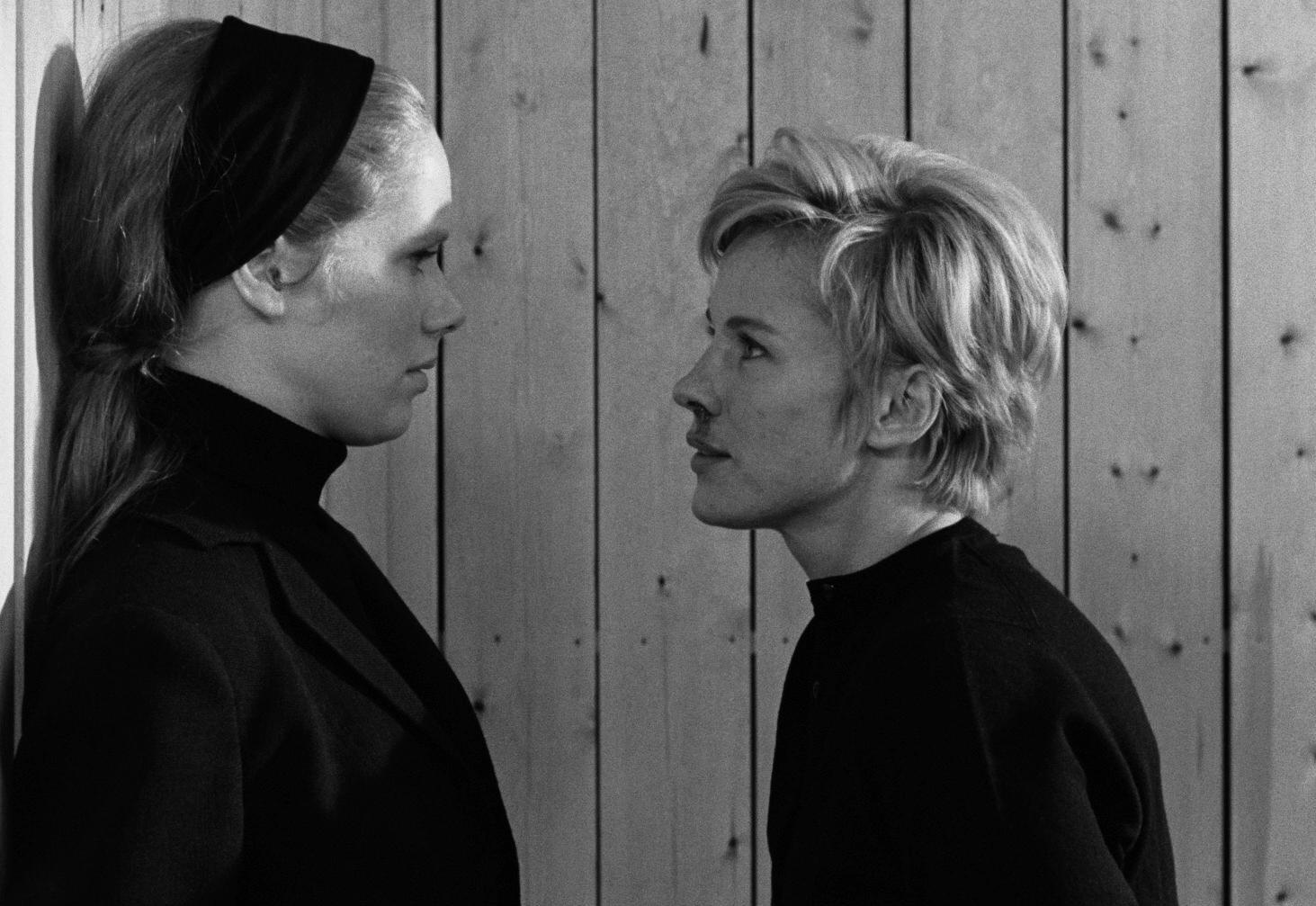
We have finished the journey through the first half of Bergman’s bountiful career. Even though his larger religious quandaries stopped after The Silence, the director began crafting movies in color about a wide range of other topics, all the way up until his death in 2007. Though perhaps not set in the Godless world he created, these later films sometimes revisit the themes constructed in the earlier years. In The Passion of Anna, the betrayed character of Eva Vergerus asks “Would you tell your kids about God? I wouldn’t teach them to believe.” Doubt weaves its way in and out of almost every Bergman piece, making all of his movies essential for anyone who appreciates cinema in the slightest. To quote the director: “Film as dream, film as music. No art passes our conscience in the way film does, and goes directly to our feelings, deep down into the dark rooms of our souls.”
I’m not sure there has ever been a more influential filmmaker as Ingmar Bergman. As we journey through his career, he has crafted some of the most beautiful, thought provoking films asking real life questions about the existential dilemmas most directors only dream of tackling. Not only were Bergman’s messages relevant during the time in which his films were made, but his central themes can still hit close to home in modern day life. Having grown up in a Cristian household myself, I have battled with what is important and what is expendable as I grow older. Besides being a master behind the camera, Bergman was an incredible storyteller; his work will be viewed and celebrated for years and years to come.


